‘Referendum on energy’: Peter Dutton ready for nuclear election as the Coalition unveils bold energy plan
The first of up to seven nuclear reactors would be in the energy system by 2035 under the Coalition’s plan to offer Australia an energy alternative.
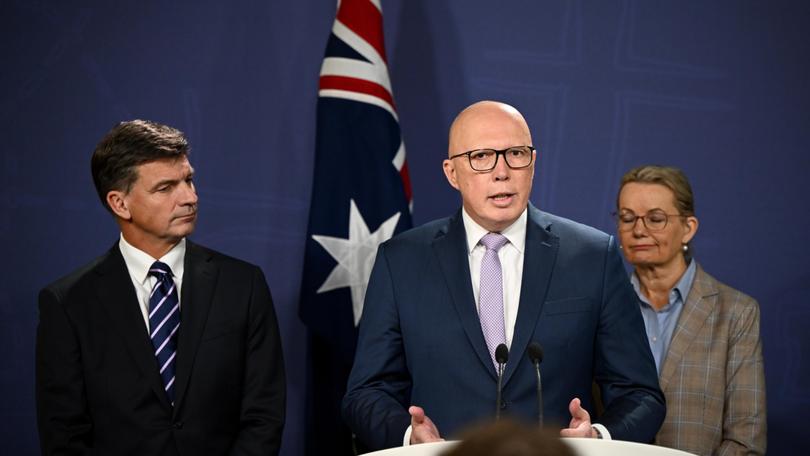
Opposition leader Peter Dutton has positioned the next federal election as a “referendum” on energy after releasing his long-awaited nuclear policy, arguing the Coalition has a “credible pathway to net zero”.
After months of mounting speculation, Mr Dutton on Wednesday confirmed that under his proposal, the first of seven Commonwealth-owned nuclear reactors would be in the energy system by 2035 and all would be operational by 2050.
He outlined his plan to transition existing, ageing coal-fired power stations at Liddell and Mt Piper in NSW, Loy Yang in Victoria, Callide and Tarong in Queensland to nuclear power plants under a Coalition government, using existing transmission line infrastructure.
Sign up to The Nightly's newsletters.
Get the first look at the digital newspaper, curated daily stories and breaking headlines delivered to your inbox.
By continuing you agree to our Terms and Privacy Policy.His policy would mean power stations at Collie in Western Australia and Port Augusta in South Australia become small modular reactors.
He framed the next election, due by May 2025, as a “referendum” on Australia’s climate future.
“I’m very happy for the election to be a referendum on energy, on nuclear, on power prices, on lights going out, on who has a sustainable pathway for our country going forward,” Mr Dutton said.
If the Coalition is successful it would face an uphill battle in convincing the state premiers — given five proposed sites are encompassed by state nuclear bans — and the federal parliament to repeal the moratorium.
Mr Dutton was confident he could get the states on board, but he is yet to provide details around cost or funding, the types of reactors, where the waste would go, or how his ambitious timeline would be achieved.
He instead argued the Coalition had a “credible pathway to net zero” claiming that while it would cost a “fraction” of Labor’s renewables transition, it would still attract “a big bill”.
A recent CSIRO report estimated it would take at least 15 years to get the first nuclear site up and running, and cost between $8.6 billion and $16b.
“We will have more to say in relation to the cost in due course, and as you know, we’ve done this in a step-by-step process,” Mr Dutton said.
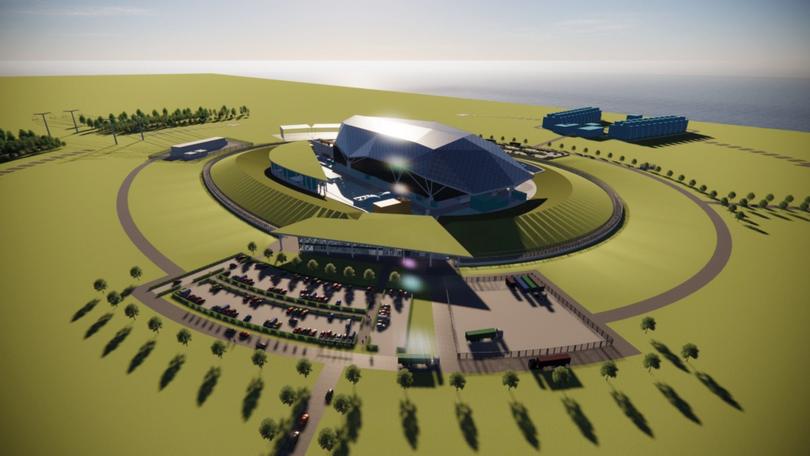
Under his plan, the Commonwealth would own and operate the plants in a similar fashion to how Snowy Hydro and the NBN operate.
Mr Dutton said his aim was to work with the companies that currently own the sites, but if compulsory acquisition was required then “the Commonwealth has ample power” to do so.
When asked how he planned to get the first two reactors in the system by 2035, and the rest before 2050, Mr Dutton said the 2040s were a “reasonable runway”.
“Other countries have done that sort of rollout,” he said.
The announcement has added further fuel to the bubbling political climate wars, just weeks after Mr Dutton said a Coalition government would scrap Labor’s 2030 target of 43 per cent emissions reduction, but remained committed to net zero by 2050.
Mr Dutton took aim at Labor’s “renewables only” policy, which he said was not fit for purpose and risked blackouts and harming the economy.
He confirmed gas would have a major role to play in the transition period before the nuclear reactors were up and running.
Climate Climate Change and Energy Minister Chris Bowen said Labor was offering voters an alternative that supported crucial investment in reliable renewables.
“The Australian people now have a very clear choice. Stick with the plan or go with this uncosted, un-modelled fantasy that Mr Dutton is proposing today,” he said.
Labor criticised the Coalition’s announcement as an “undercooked fantasy”, which it claimed left “more questions than answers”.
“Having promised an energy policy, (Mr Dutton) released a list of sites with no costs, no details, no modelling, and they couldn’t even release the number of gigawatts or megawatts that would be added to the energy system as a result of this policy, and they can’t even confirm that these details will be released before an election, not after,” Mr Bowen said.
“We know that nuclear is too expensive, too slow to build, and too risky for energy reliability.”
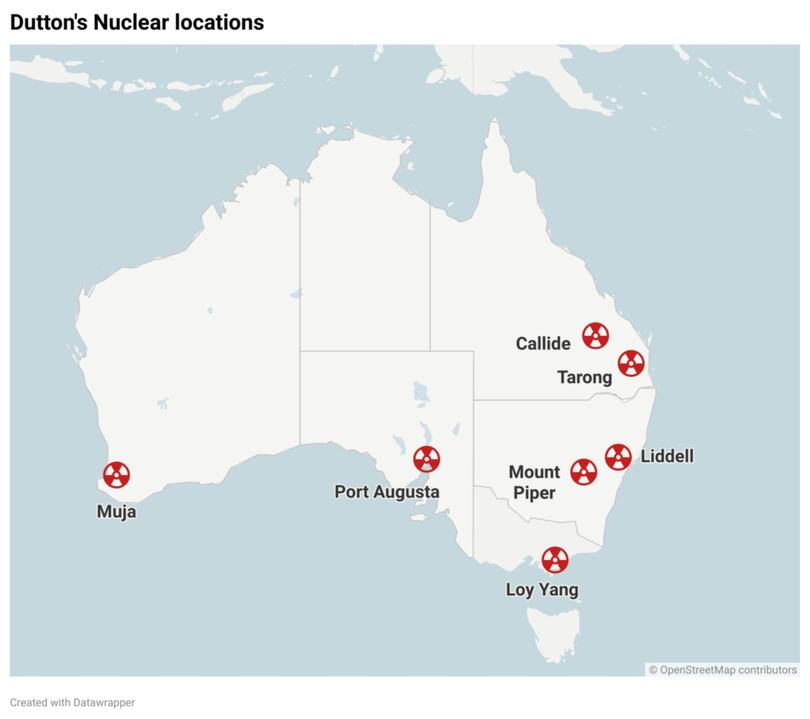
The CSIRO has previously claimed the power from nuclear reactors would cost up to eight times more than that from renewables.
But Coalition energy spokesman Ted O’Brien said adding nuclear to the system would lower Australians’ bills.
“We’re putting consumers at the centre,” Mr O’Brien said.
Treasurer Jim Chalmers argued nuclear energy would push up power prices, and renewables remained the cheapest form.
“(Nuclear) takes longer, it will push up prices, and it will squander all of the advantages that we have as a country,” Dr Chalmers said.
Nationals leader David Littleproud spruiked the plan — which has been championed by his party — as a “vision for regional Australia” that provides more certainty for the country than renewables.
“This is about a vision for regional Australia. One that is not covered in solar panels and wind turbines and transmission lines, but gives them hope,” he said.
“It is a vision for the men and women who are in our coal-fired power stations across the country in Latrobe, in Collie, Port Augusta, the Hunter, Lithgow, Callide, Biloela and Tarong. It is a vision and belief in them.”
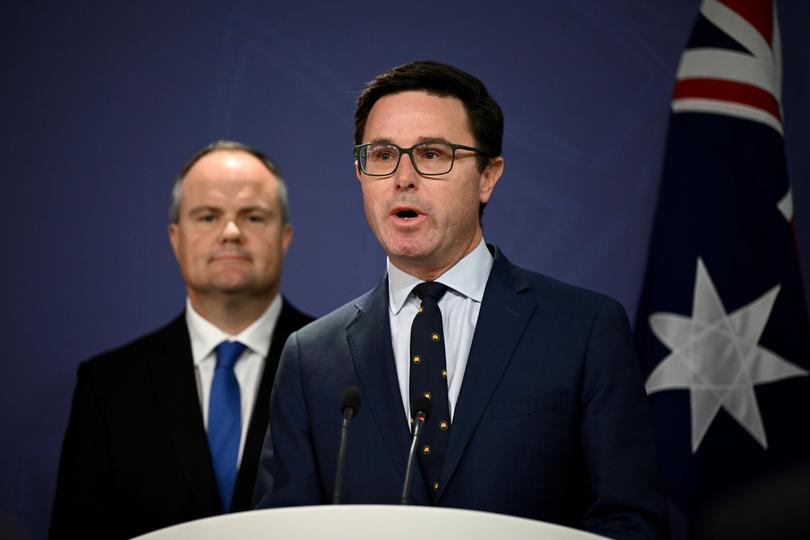
Under the Coalition’s proposal, the seven communities would receive a “benefits package”, including guaranteed high-paying jobs for future generations, an integrated economic development zone attracting manufacturing, and a regional deal unlocking investment.
Nationals deputy leader Perin Davey said if any communities were “absolutely adamant” against a nuclear reactor, the Coalition “will not proceed” and had no intention of looking further than the seven sites announced.
One of the biggest barriers the Coalition will need to overcome is getting the states on board.
NSW Premier Chris Minns said building nuclear reactors in his state would not be possible under existing legislation.
“We’ve got a prohibition in nuclear power on-in-the state. My government is not going to waive it and my understanding is the Government and Opposition in Queensland won’t waive it either,” he said.
“We have questions on whether this is a pipedream or legitimate energy policy.”
Victorian premier Jacinta Allan, speaking before Mr Dutton unveiled the plan, said the federal Coalition were seeking to “bring more expensive, more risky, more toxic energy solutions to the people of this country”.
“We absolutely will not stand for that,” she said.
SA premier Peter Malinauskas, who has previously said he is open to a conversation about nuclear power and it should be in the global energy mix, rubbished Mr Dutton’s proposal on Wednesday.
“I support nuclear power, unless it makes electricity more expensive, and all the evidence says it will make electricity a lot more expensive,” he said.
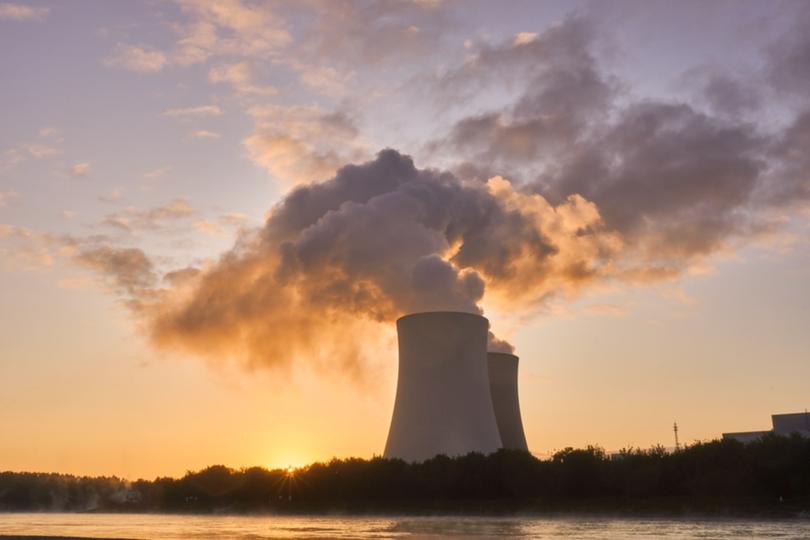
Queensland premier Steven Miles warned power bills could go up “four to six times” to fund the nuclear reactors.
“That is not to mention how future generations - my kids, your kids - will need to manage dangerous radioactive nuclear waste, forever. That’s what that plan means,” he said.
The LNP’s David Crisafulli, in pole position to become the next Queensland premier, said nuclear was “not part of our plan in Queensland” and has ruled out winding back the state’s ban should he win the election.
WA Energy Minister Reece Whitby labelled the idea a “recipe for disaster” for the state’s energy market.
“It makes no sense for Australia. It certainly makes no sense for WA,” he said.
Mr Dutton said he was confident the Opposition would be able to negotiate with state premiers on the policy.
“We’ve seen the premiers in different debates before where they’ve been able to negotiate with the Commonwealth, and we’ll be able to address those issues,” he said.
Mr Bowen said Mr Dutton needed to come clean on how he planned to convince the state leaders.
“Dutton needs to explain how he would overturn those bans, not abuse the premiers, not berate and complain about the premiers but outline what his own plan is,” he said.
Mr Dutton had earlier also talked down concerns over nuclear waste, saying it would be stored on sites around the country and then moved to a permanent national dump site in future decades.
“If you look at a 470-megawatt reactor, it produces a waste equivalent to the size of a can of Coke each year,” Mr Dutton said.
The Minerals Council of Australia endorsed the Coalition’s policy, saying it provided a “crucial pathway for Australia’s industries” on the road to net-zero.
“High future demand for reliable and clean energy means that all energy types, including nuclear power will be indispensable in meeting Australia’s future energy needs,” CEO Tania Constable said.
Greens leader Adam Bandt said “the battle lines for the next election are clear”.
“Peter Dutton can’t win government and he can’t repeal the nuclear ban in the Senate. It’s a ‘dead cat’ strategy,” he said.
The Climate Council claimed the Coalition’s scheme was a “clear case of radioactive greenwashing and a scheme for more climate pollution”.
“The winners from this scheme are the multinational coal and gas corporations who will keep polluting until well past mid-century,” CEO Amanda McKenzie said.
Independent MP Zali Steggall said Mr Dutton was “dreaming” if he thought nuclear energy would keep the cost of living down.
“The reality is that climate change is making every aspect of cost of living worse. And the longer he delays sensible action, the more costly it gets,” she said.

